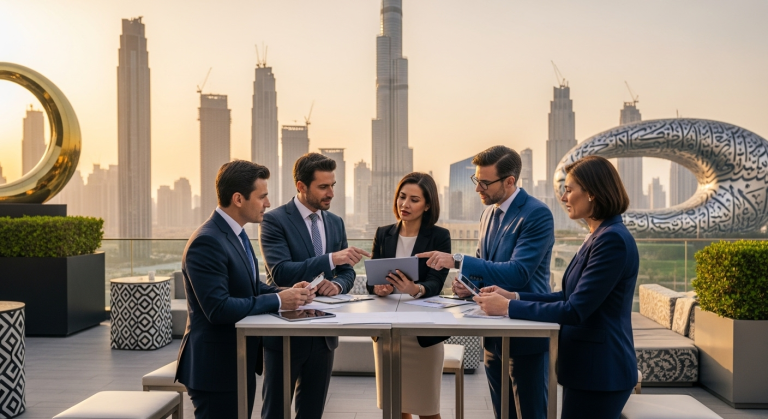Market Analysis and Opportunities
Target Market Analysis
The United Arab Emirates (UAE), particularly Dubai, is a global tourism powerhouse. Despite the mature market for luxury and adventure tourism, there is an untapped niche for boutique travel agencies focused on cultural tours. According to the UAE Ministry of Economy, tourism contributed roughly AED 164.7 billion ($44.9 billion) to GDP in 2022, accounting for 12.1% of the country’s total GDP. Dubai alone welcomed 14.36 million international visitors in 2022, and forecasts expect steady growth at a CAGR of 8%-10% through 2027.
Global travelers are increasingly seeking authentic, immersive experiences—a trend accelerated by post-pandemic travel behaviors. Boutique cultural tours cater to sophisticated travelers who prioritize uniqueness, learning, and local connections. In Dubai, the multicultural demographic (85% expatriate population) and the Emirate’s status as an events and arts hub drive demand for curated, high-value experiences. Key market segments include:
- Affluent international tourists
- Expatriates and global residents
- Cultural enthusiasts and art connoisseurs
- Corporate clients seeking bespoke team-building or networking experiences
Key buying patterns in the UAE feature advanced digital adoption: over 80% of travelers research and book trips online, favoring agencies that offer seamless digital interactions, pay-later options, and real-time concierge support.
Industry Trends Shaping the Market
- Digital Transformation: Real-time booking, AR-enhanced tours, and AI-powered recommendations are revolutionizing customer experience.
- Sustainability: There is rising demand for eco-friendly travel options, heritage preservation, and responsible tourism—aligned with Dubai’s Vision 2030.
- Hyper-Personalization: Travelers expect tailored itineraries, multilingual guides, and access to exclusive cultural sites or events.
Marketing Needs
To effectively position a boutique travel agency specializing in cultural tours, robust marketing strategies tailored to Dubai’s digital-first audience are essential:
- Market Research: Continuous audience, competitor, and trend analysis are crucial for product development and brand alignment.
- Digital Campaigns: High-ROI approaches include SEO for “cultural tours in Dubai” and PPC targeting “luxury travel Dubai.” Arabic, English, and Russian content localization enhances reach.
- Branding Strategies: A strong visual identity and partnerships with cultural institutions bolster credibility and differentiation.
Targeted tactics should include influencer collaborations, virtual tour teasers on Instagram and TikTok, and reputation management via TripAdvisor and Google Reviews. Leveraging support and business setup services by local consultants can expedite marketing entry and compliance.
Expansion Potential
Dubai’s geographic and economic position offers several expansion vectors:
- New Segments: Entering the B2B market with corporate offsites; targeting GCC residents for regional “staycations.”
- Geographical Expansion: Scaling to other Emirates (Abu Dhabi, Sharjah) and extending collaborations to Oman, Qatar, or Saudi Arabia through multi-destination cultural packages.
- Diversification: Developing thematic tours (e.g., culinary, art, wellness), or virtual/augmented reality experiences for remote audiences.
Comprehensive Business Overview
Located in Dubai, the boutique travel agency for cultural tours caters to the luxury and experiential tourism sectors. The business model is built on creating personalized, high-end cultural tours—covering heritage sites, local arts, Emirati traditions, culinary trails, and exclusive museum experiences—with a focus on seamless digital booking and bespoke concierge services.
- Industry: Tourism, Cultural Services, Luxury Hospitality
- Business Model: Curated B2C and B2B experiences via direct sales, partnerships, and online platforms
- Target Audience: High-net-worth tourists, expatriates, corporate clients, international schools
- Operational Scope: Primarily Dubai, with plans for regional GCC reach
Mission: To deliver authentic, immersive cultural experiences that forge lasting memories and foster cross-cultural understanding.
Vision: To be the leading provider of bespoke cultural travel in Dubai and the broader UAE, blending heritage with innovation.
Core Objectives:
- Redefine cultural tourism through personalized itineraries and exclusive access
- Champion sustainable travel aligned with UAE’s tourism vision
- Leverage digital platforms for seamless customer journeys
Depending on current status, the business is often in the startup to early growth stage, registered in a Dubai Free Zone to maximize benefits like 100% foreign ownership and simplified licensing.
Competitive Advantage
Entrepreneur Perspective
Dubai’s supportive business environment, coupled with relatively manageable entry barriers for digital-forward travel agencies, positions this venture as highly viable. The growing appetite for experiential tourism and the government’s ongoing investment in cultural assets bolster founder confidence.
- First-Mover Opportunity: Limited competition in authentic cultural experiences, especially those leveraging digital innovation.
- Agility: Boutique scale allows rapid customization and pivoting to market trends.
Investor Perspective
Cultural tourism in the UAE is on an upward trajectory, supported by mega-events (e.g., Expo 2020 legacy) and strong government backing for the creative economy.
- High ROI Potential: Untapped niche with strong yield per customer and upselling opportunities through premium packages.
- Resilience: Diversified target markets (tourists, locals, MICE) reduce risk from seasonal or macroeconomic fluctuations.
- Scalability: Digital-first model enables rapid scaling across GCC and potential export of proprietary booking technology.
Manager Perspective
Strategic partnerships with hotels, museums, local authorities, and international travel operators offer operational leverage. Small, highly skilled teams can deliver superior customer experience and brand loyalty.
- Process Efficiency: Use of cloud-based CRM, ERP, and marketing automation reduces overhead and enhances guest service.
- Exclusive Access: Local alliances (e.g., with heritage centers or art galleries) create defensible value propositions versus generic competitors.
Financial and Investment Needs
Financial Requirements
Based on UAE market standards, initial capital outlay typically ranges from AED 350,000 to AED 750,000 for setup and one-year operations. Below is a generalized breakdown:
- Infrastructure/Office: AED 60,000–120,000
- Licensing/Registration: AED 50,000–70,000 (varies Free Zone/Mainland)
- Staffing (3-7 employees): AED 200,000–350,000 annual wages
- Digital Assets (website, CRM, app): AED 70,000–150,000
- Branding/Marketing: AED 50,000–130,000
- Working Capital: AED 100,000+
Investment Potential
Return on investment is attractive due to high-margin, low-volume business, with strong opportunities for repeat and referral sales. Investors benefit from Dubai’s tax incentives, global tourist influx, and robust legal protections.
- Popular models: Equity partnerships (for growth), revenue sharing (for local partners), or convertible notes (for angel/VC investors).
Financial Risks and Mitigation
- Cash Flow: Seasonality or economic shocks may impact bookings. Solutions: Diversify offerings, maintain buffer capital, and pursue B2B contracts for stability.
- Currency Fluctuations: Especially relevant for international payments. Solutions: Hedge exposures, price in AED whenever possible.
- Setup Costs: High upfront licensing or marketing spend. Solutions: Leverage Free Zone packages, phased hiring, and staged investment rounds.
- Legal Risks: Insurance coverage and compliance audits recommended to mitigate liabilities.
Human Resources and Recruitment
Workforce Needs
Boutique agencies emphasize quality over quantity, usually requiring:
- Tour consultants and guides (multilingual, with deep local knowledge and hospitality skills)
- Sales/marketing professionals (digital & event-oriented)
- Operations manager (logistics, partnerships)
- IT or systems support (web, CRM, content creation)
A mix of permanent and temporary/contract staff enables flexible scaling during high and low seasons.
HR Challenges and Solutions
- Talent Attraction: High demand for skilled hospitality and tech workers. Solution: Offer competitive salaries, visa support, and attractive benefit packages.
- Retention: Implement regular training, clear growth paths, and performance incentives.
- Training: Invest in customer service, cultural literacy, and technology proficiency.
Compliance with UAE Labor Laws
Staying compliant involves:
- Issuing formal contracts aligned with Ministry of Human Resources and Emiratization standards
- Fulfilling visa and residency requirements for all non-UAE nationals
- Ensuring payment of end-of-service benefits, annual leave, and mandatory insurances
Consultation with experienced providers or legal advisors, such as those at Residency and Citizenship Services, is recommended for ongoing legal compliance.
Infrastructure and Operations
Infrastructure Needs
For optimal cost-efficiency:
- Leverage Dubai Free Zone co-working spaces or hybrid remote models to reduce fixed overheads
- Invest in robust cloud-based booking and CRM systems (e.g., Salesforce, Zoho)
- Utilize mobile devices and POS hardware for on-the-go service delivery
Operational Optimization
Process mapping and automation are key. Weaknesses often lie in fragmented customer data, manual bookings, or inefficient communication. Actionable improvements:
- Implement end-to-end ERP
- Digitize supplier contracts and client communications
- Utilize automated marketing funnels and feedback loops
Legal Compliance
Ensure registration and licensing with Dubai DED or relevant Free Zone authorities, open compliant local bank accounts, and regularly update trade licenses. Work with consultants such as Persian Horizon’s Business Setup Services for streamlined compliance and ongoing regulatory support.
Innovation and Technology
Adopt or enhance:
- Mobile-optimized booking platforms
- AI-powered customer service/chatbots
- Virtual and augmented reality content for pre-trip engagement
- Data analytics for continuous refinement of offerings and marketing
Digitization will be a significant differentiator in the competitive Dubai market.
Marketing and Branding Strategies
Brand Status: Awareness and Positioning
Startups must invest in immersive, culturally evocative branding. This includes strong visual identity, consistent messaging, and active presence at Dubai’s travel and culture events. Key strengths are authenticity and expert curation; areas for improvement may include boosting digital touchpoints, PR, and influencer collaborations.
Marketing Channels
Effective strategies will bridge digital and traditional outreach:
- SEO and content marketing (e.g., “luxury Dubai cultural tours”)
- Social media ads (Instagram, TikTok in English, Arabic, Russian)
- Strategic partnerships with hotels and museums
- Online travel aggregators and Google My Business
- Targeted print coverage in hospitality magazines
Engagement with industry news and thought leadership, such as through the Persian Horizon blog, builds trust.
360-Degree Campaigns
Multi-channel tactics amplify customer interaction:
- Simultaneous launches across web, social, PR, and email
- Pop-up events or influencer-led experiences
- Live-streamed tours or expert Q&A webinars
Growth and Development Potential
Growth Strategies
- Form partnerships with airlines, luxury hotels, and international tour operators
- Develop multi-day, cross-Emirate packages
- Build a scalable digital platform with white-label potential for other markets
Networking
Local institutional partnerships and alliances—such as those available through Persian Horizon’s Investment Consulting Services—provide valuable inroads for B2B and B2G growth. Collaborating with Dubai Tourism, events bureaus, and cultural institutions enhances credibility and market access.
International Potential
Dubai’s visa-on-arrival policies and world-class air links make it a strategic springboard for global expansion. Licensing proprietary tour operations technology or launching Arabic-themed tours in foreign cruise or group markets could further boost international reach.
Sustainability and Innovation
The agency’s commitment to eco-friendly practices—carbon-neutral transport, support for local artisans, digital tour booklets—resonates with Dubai’s sustainable tourism mandate. Adopting blockchain for transparent booking or NFTs for unique cultural experiences could set industry standards.
Alignment with Dubai’s Market
Cultural Alignment
Embracing Dubai’s diversity, the agency must offer multi-language support, inclusive tour options for different faiths and dietary requirements, and respectful representation of local heritage. Ongoing staff training ensures adaptability.
Local Regulatory Compliance
Full adherence to UAE commercial, tax, and labor regulations is mandatory. Work with expert advisors to monitor regulatory updates, tax filings, and labor law changes.
Advantages of Dubai
Dubai’s position as a global crossroads offers:
- Tax-free income for qualifying businesses
- State-of-the-art infrastructure
- Efficient government services and e-government platforms
- Proximity to Europe, Asia, Africa—ideal for global partnerships
Local Challenges
Key obstacles include stiff competition, high operational costs, and complex licensing. Solutions:
- Differentiation through unique cultural products
- Strategic investment in technology and automation
- Regular benchmarking of offerings and pricing
Conclusion
Boutique travel agencies for cultural tours present a lucrative business opportunity in Dubai, leveraging the Emirate’s booming tourism sector and appetite for high-end, authentic experiences. The sector’s growth is underpinned by strong government support, innovation, and sustainability trends. However, success requires a robust digital presence, deep local partnerships, compliance with UAE regulations, and attentiveness to market evolution.
Actionable Recommendations
- Engage experienced partners, such as Persian Horizon, to streamline business setup, compliance, and market entry.
- Invest in digital transformation to enhance customer experience and operational efficiency.
- Pursue inclusive and adaptive marketing strategies for Dubai’s multicultural marketplace.
- Regularly benchmark competitors and refresh offerings to secure industry leadership.
- Leverage Dubai’s global position for future expansion into GCC and global markets.
For comprehensive support in launching, investing in, or scaling a travel business in Dubai, consider working with Persian Horizon’s tailored setup, consulting, and investment services. Visit Persian Horizon for more insights, updates, and support opportunities.







